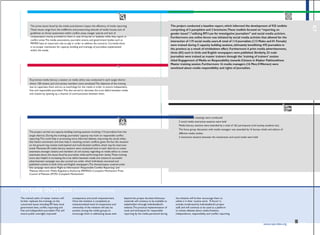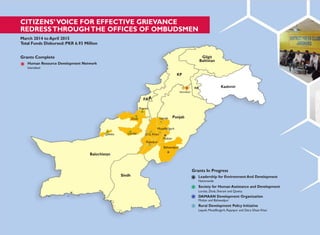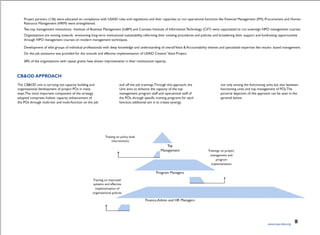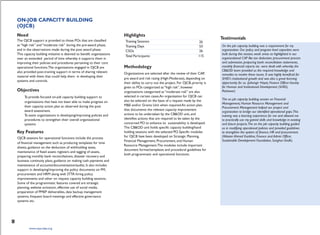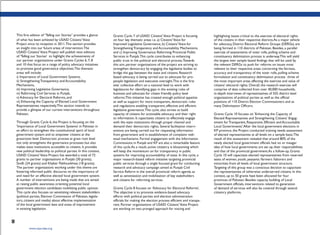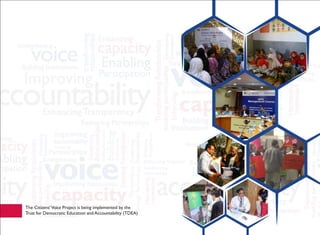The document is a catalogue produced by the Trust for Democratic Education and Accountability (TDEA) that summarizes the achievements and stories of partner organizations involved in the USAID Citizens' Voice Project over 4 years. The project aimed to strengthen citizen engagement with the government to advance good governance through initiatives like legislative and policy reform. The catalogue features over 100 partner organizations and outlines their efforts to empower citizens and increase accountability.



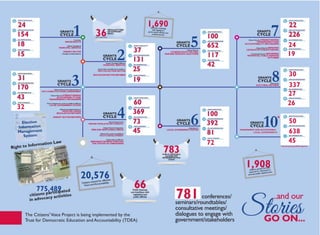




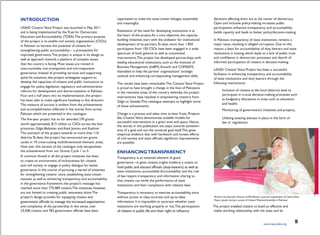


![FOSTERING PARTNERSHIPS
Partnerships promote sharing of ideas, information and
resources, which is mutually beneficial for citizens and
establishment of agencies which play an important role in
USAID Citizens'Voice Project facilitated the the decision-making process.Thus, the concept of
education related policy dialogues with elected represent-
such as consultative meetings and discussions involving Akhter Hameed Khan Resource Centre (AHKRC), under to exhibit information material onTMA municipal
government departments and the citizens helped Grants Cycle-1 for Citizen Oversight of Municipal Services, processes and rules & regulations.
transform relationships and enhance citizens' voice by facilitated four public hearings in Peshawar.
enabling their participation in the policy-making process.
Furthermore, a total of 11 policy-making proceedings
were held in which the TLCs and DSCs provided
feedback on policies and voiced their concerns
regarding transparency and accountability at the
local level.
In order to strengthen accountability of elected and public
officials, USAID Citizens‘Voice Project facilitated 66 ―khuli
kachehris‖ (public hearings) and interfaces with legislators and
public officials.This component involved activities which not
only transformed relationships between the state and citizens state Collaboration with the community leads to the
but also supported civic advocacy and oversight roles within
the context of specific policy areas. Moreover, the
intervention by Azad Jammu and Kashmir (AJK)
Rural Support Programme for establishing
Citizens'Voice Project helped in drafting 34 bills/ partnerships is central to strengthening citizens' voice and
policies/discussion papers, policy briefs, strategy increasing the level of transparency and accountability of
complaint offices in three districts of AJK to papers through civil society consultations.The public institutions.
address citizens' concerns regarding electricity
load management.A total of 1,560 grievances were
recorded and sent to the relevant departments
for action and planning.
Similarly, the project facilitated 206 applied
research interventions to assess the
performance of public service departments.
This enabled organizations to not only assess
the existing situation, but also facilitated
formulation of evidence and research-backed
“We used to cajole them and
bribe them [the authorities] to
realize our own rights. But we can
now stand with dignity in front
of public servants and demand
our right in the most proper
manner,” states Muhammad
Ismail of Rohri, Sukkur.
USAID Citizens'Voice Project fostered partnerships
between public departments and citizen groups/CSOs
at the grass-root level in the form of formal Memorandums
of Understandings (MoUs) as well as informal engagements
(seminars, conferences, roundtables and dialogues).
recommendations for policy, legislative and
administrative reforms. For instance, READ aim of these activities was to strengthen citizens' voice in
Foundation, under Grants Cycle-2 for education sector public decision-making spheres, for sustainable impact.The
reforms, conducted an initial survey to facilitate citizens to Project also helped frame 33 charters of demands, which
effectively engage with the government to raise specific were presented to public officials or elected representative
issues of hiring and transfers of teachers and expansion and for endorsements.
rehabilitation of schools in District Poonch,AJK.The
intervention has contributed to transformed relationships
and broadened citizens‘ participation and inclusiveness in
It is important to mention that due to USAID Citizens'
Voice Project, CPDI was able to draft a model law for
RTI, which was later tabled and introduced in the
atives. As a result, there was a significant increase in Khyber Pakhtunkhwa Assembly.The Project also helped
the school enrolment of children in district Poonch. form 218 complaint mechanisms including helplines,
facilitation desks, complaint box/desks, and help
Village kids attending the newly opened school at Khorooro,Thar
Though the regulatory framework of parliamentary
standing committees allows them to hold public hearings,
this option is rarely used in Pakistan.The USAID Citizens'Voice
Project facilitated six public hearings of standing committees
in this regard.The NGO Sudhaar, under Grants Cycle-2 for
education sector reforms, facilitated a public hearing of the
PunjabAssembly‘s Standing Committee on Education.Similarly,
iv
www.cvpa-tdea.org
desks. For instance, PEACE Sindh, under Grants Cycle-1
for Citizen Oversight of Municipal Services, established
a helpline for citizens to lodge complaints and get
information regarding Tehsil Municipal Administration
(TMA) inTaluka Hussain Bux Mari, Mirpurkhas Sindh.
Similarly, DADO, under the same Grant Cycle 1, formed a
district resource center in Upper Dir,Khyber Pakhtunkhwa
SRSP resolved our problem and told us to
submit collectively signed applications.As a
result, we got the school opened within two
months,” says Hameed Pasayo, a peasant
from a village ofTharparkar.](https://image.slidesharecdn.com/7a2eec09-047c-4b6e-bded-0ee6c272eca9-170111120311/85/CVP-SHOWCASE-CATALOG-12-320.jpg)


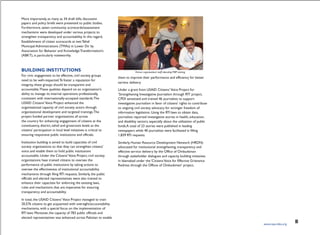
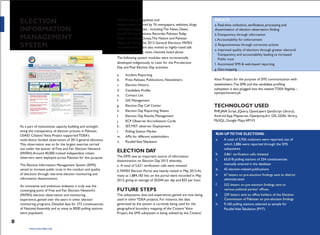




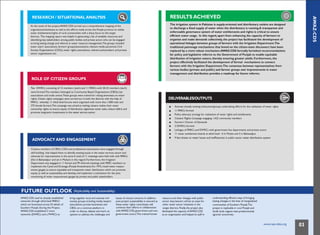



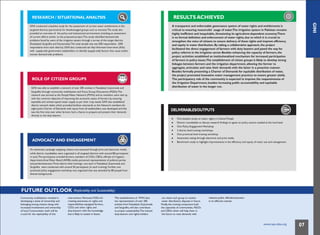






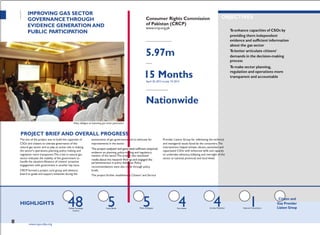


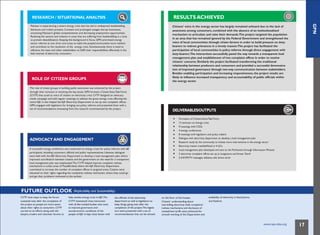




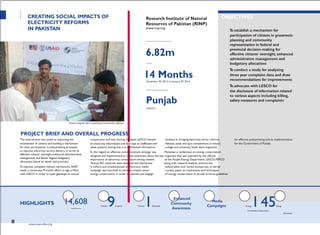





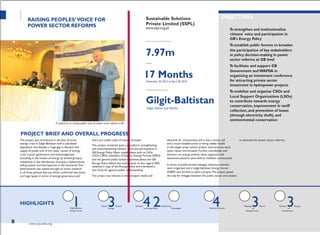








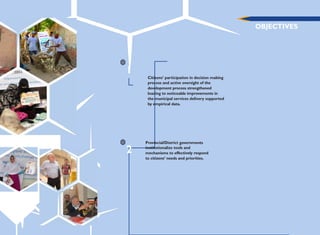
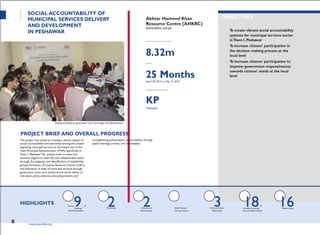





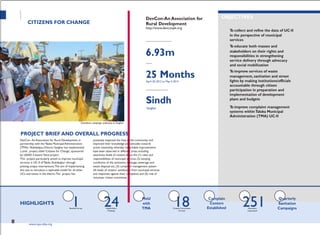
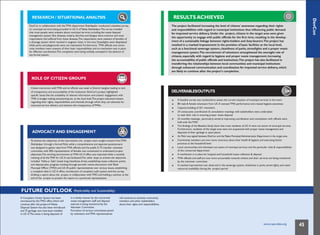






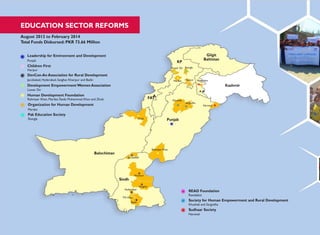
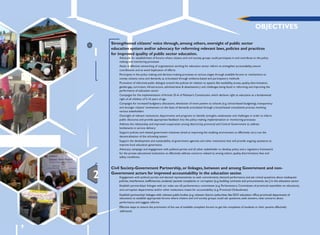

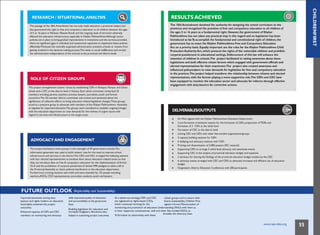

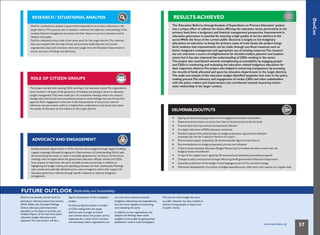


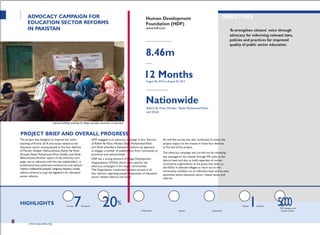

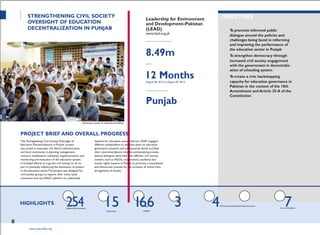




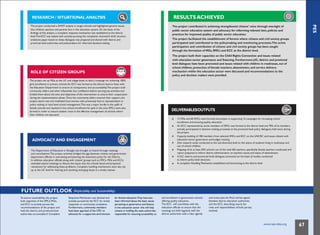
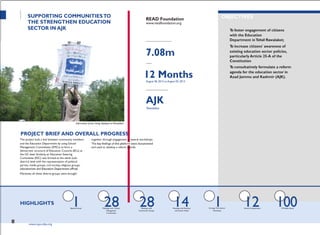
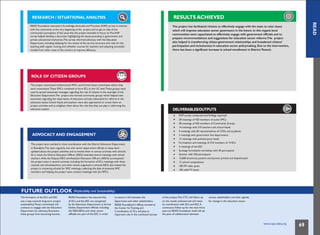




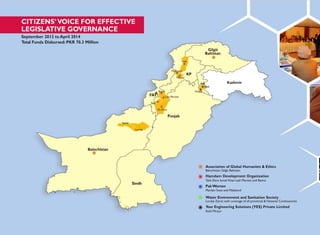
![1
2
OBJECTIVES
Strengthened citizens‟ voice through, among others, oversight of the legislature and
the legislators and/or advocacy for reforming relevant structural and operational
laws, policies, procedures and practices for improved performance of the legislature.
Priority focus is on the representational and oversight role of the legislature.
Public awareness campaigns about the roles, responsibilities and functions of legislatures, as well as the challenges that need to be
addressed for improved legislative performance
Establishing information exchange hubs, networks and collaborations of citizen groups, civil society organizations and watchdogs
to oversee legislative affairs and monitor legislators' performance
Establishing and enhancing linkages between provincial and national legislators to bridge the gap between national and provincial
Taking concrete steps for establishment of additional or new forums for citizens and civil society groups to interact with
legislators, and participate in or contribute to the legislative or executive oversight work performed by legislators
Developing through a consultative process a Citizens' Charter of Demands vis-à-vis the performance of the Federal or a
Provincial legislature
transparently, honestly and fairly
Enhancing civil society participation in the oversight processes at various stages through available forums or mechanisms at
Federal and provincial levels to convey citizens' voice and demands
Promotion of informed public dialogue around the roles, functions and performance of legislators and legislatures, and the
challenges being faced in reforming and improving the performance at the Federal and provincial levels
Campaigns for more effective legislative procedures in areas like budget approval and oversight [e.g. budget review by
disclosure], and mandatory requirements for public hearings
Contributing towards better scrutiny and analysis of legislative affairs and legislators' performance by pluralistic media by calling
legislators to account on their manifestos and agendas and by analyzing their performance in terms of legislation and executive
oversight.
Linkages, between and among Government, political parties and non-Government actors for
improved accountability of the legislature and the legislators.
Establishing partnerships/linkages with legislators or relevant legislative bodies at the Federal and provincial levels to establish appropriate forums
where citizens and civil society groups could ask questions, seek answers, raise concerns about performance of legislators and suggest reforms with
the aim of strengthening legislative transparency and accountability
Informing and supporting members of the public about how they could use the legislative committees to get their complaints vis-à-vis public bodies
Resolved
Engaging with elected representatives or other relevant institutions to highlight complaints of constituents and citizens (including the ones against
legislators), and get the same addressed to increase accountability in legislators' performance
accountable and transparent governance.](https://image.slidesharecdn.com/7a2eec09-047c-4b6e-bded-0ee6c272eca9-170111120311/85/CVP-SHOWCASE-CATALOG-93-320.jpg)
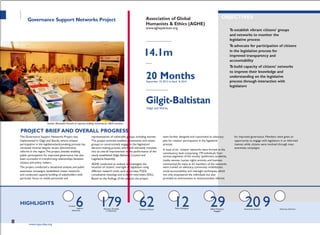



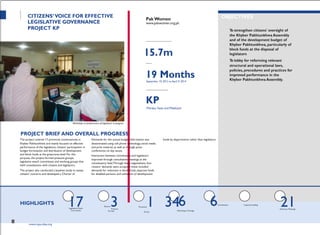
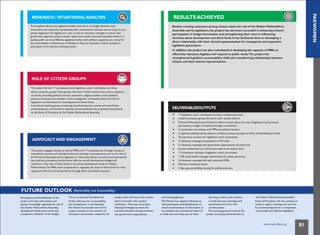





![OBJECTIVES
1
2
Strengthened citizens' voice through, among others, oversight of the FATA Secretariat,
FATATribunal and other relevant authorities, and/or advocacy for the implementation of
Frontier Crimes Regulation (FCR) reforms for protection of human rights.
anticipated that the public information campaign would be jointly developed with the FATA Secretariat or other relevant
Authorities
Promotion of informed public dialogue around FCR reforms and their implementation issues as well as the challenges that need
to be addressed for protecting human rights
Establishing information exchange hubs, networks and collaborations of citizens groups, civil society organizations and watchdogs
to oversee FCR reforms and monitor their implementation
Taking concrete steps for establishment of forums [if such forums do not exist or when there is a need for additional ones]
where citizens and civil society groups could interact with the FATA Secretariat, and participate in or contribute to the oversight
work being performed by the Secretariat
Enhancing civil society participation in the oversight of FCR reforms' implementation at various stages through available forums
or mechanisms to convey citizens' voice and demands, as articulated through evidence-based and participatory methods
Contributing towards better scrutiny, reporting and analysis of FCR reforms, their implementation and human rights' violations
through pluralistic media, especially by making sure that the voices of the public are heard, and by analyzing the extent, speed and
quality of reform implementation
Designing a communication and information strategy to inform FATA citizens on process and procedure to approach FATA
Tribunal
Establishing a database to document, track and report on human rights violations in FATA.
Linkages, between and among Government, political parties and non-Governmental actors for
improved monitoring of FCR reforms vis-à-vis implementation;
Establishing mechanisms, in consultation with FATA secretariat, to monitor human rights related issues in FATA
Establishing partnerships/linkages with FATA secretariat or relevant public bodies at the Federal and provincial levels to establish appropriate forums
where citizens and civil society groups could ask questions, seek answers, raise concerns about human rights and suggest reforms with the aim of
strengthening implementation/monitoring of FCR reforms
Informing and supporting members of the public about how they could use the mechanisms (in particular the FATATribunal) provided under the
amended FCR to get their complaints vis-à-vis public bodies/functionaries resolved.](https://image.slidesharecdn.com/7a2eec09-047c-4b6e-bded-0ee6c272eca9-170111120311/85/CVP-SHOWCASE-CATALOG-105-320.jpg)
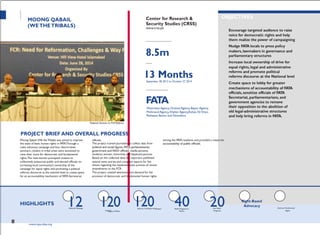






![OBJECTIVES
1
2
Strengthened citizens‟ voice through, among others, oversight of tax
departments and/or advocacy for reforming relevant laws, policies,
tax collection efforts.
Concrete steps for establishment of forums where citizens and civil society groups could participate in and
contribute to the policy making, legislative and monitoring processes at the Federal (e.g. Federal Board of Revenue
(FBR) etc.) or provincial levels (e.g. Excise and Taxation Departments etc.)
Civil society participation in the policy making and decision making processes at various stages at the Federal or
provincial levels through available forums or mechanisms [e.g. parliamentary committees] to convey citizens' voice
and demands, as articulated through evidence-based and participatory methods
Promotion of informed public dialogue around the policies and practices (in relation to aspects like fair and
equitable taxation policy, tax-payers' grievances, tax-payers' rights and reform of tax collection departments) and
challenges being faced in reforming and improving the performance of taxation sector at the Federal or provincial
Levels
Campaigns for the recognition and implementation of universally accepted tax-payers' rights (e.g. courteous, fair
and professional treatment and timely refunds), as well as for effective platforms for grievance redress in relation
to Federal or provincial authorities
Steps towards improved media reporting on tax related matters and issues
Development and/or promotion or support of a bill of tax-payers' rights in consultation with stakeholders and
with focus on Federal and/or provincial taxation systems
Oversight of relevant institutions, departments and programs to identify strengths, weaknesses and challenges in
order to inform public discourse and provide appropriate feedback into the policy making, implementation or
monitoring processes at the Federal or provincial levels.
Civil Society-Government Partnerships, or linkages, between and among government and non-
Governmental actors for improved accountability in the taxation sector.
Engagement with political parties and elected representatives at the Federal or provincial levels to seek commitments, demand performance and
the taxation sector
Establish partnerships/ linkages with (or make use of) parliamentary committees (e.g. Provincial Assembly Committee on Finance or National
Assembly/ Senate Committees on Finance), anti-corruption departments and/or other institutions meant for grievance redress or accountability
(e.g. Provincial Ombudsman and Federal Tax Ombudsman) at the Federal or provincial levels
Establish partnership/ linkages with relevant public bodies (e.g. FBR; provincial department of excise and taxation) to establish appropriate forums
where citizens and civil society groups could ask questions, seek answers, raise concerns about performance and suggest reforms.](https://image.slidesharecdn.com/7a2eec09-047c-4b6e-bded-0ee6c272eca9-170111120311/85/CVP-SHOWCASE-CATALOG-113-320.jpg)
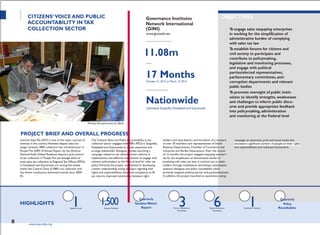






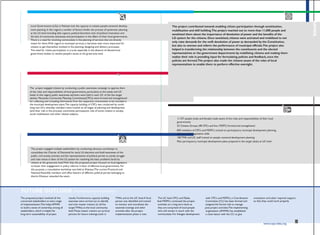
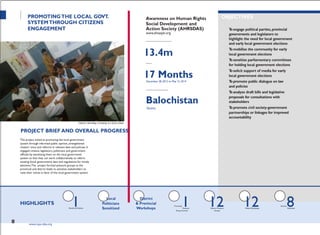


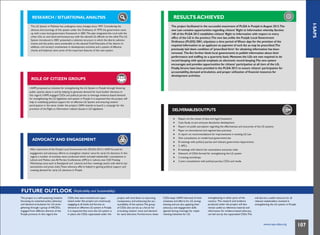

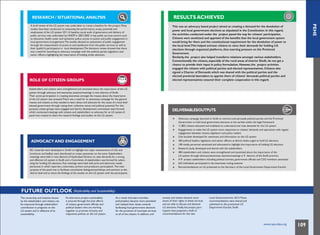

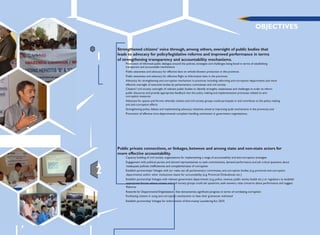


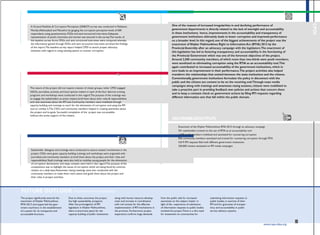






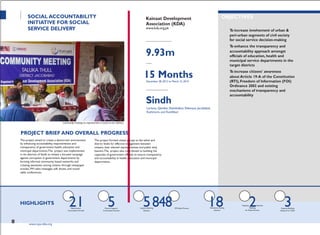



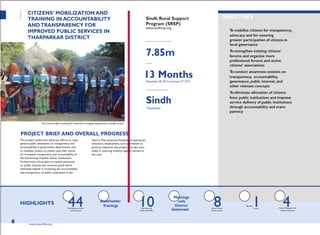

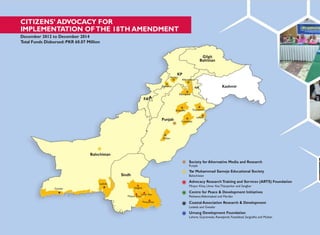
![1
2
OBJECTIVES
Strengthened citizens‟ voice through, among others, oversight of the implementation
process relating to 18th Amendment and/or advocacy for reforming relevant laws,
rules, policies, bye-laws, regulations, institutional frameworks and practices at the
provincial or district levels to make them consistent with the requirements of the
amended Constitution.
taken or ones still to be taken
Concrete steps for establishment of forums where citizens and civil society groups could participate in and contribute to the
policy making, legislative, regulatory and institutional reform processes in the respective provinces in the light of 18th Amendment
and internally recognized best practices
Civil society participation in the policy making and decision making processes at various stages involving the provincial or district
governments through available forums or mechanisms [e.g. parliamentary committees] to convey citizens' voice and demands, as
articulated through evidence-based and participatory methods
Promotion of informed public dialogue around the 18th Amendment, its implications and consequently required changes in laws,
policies, rules, regulations and practices as well as the challenges being faced in implementation at the district or provincial levels
Campaigns for the implementation of 18th Amendment, especially the aspects that are about devolution of powers and
responsibilities, to ensure that public service delivery improves through enhanced public participation at various levels
implementation of 18th Amendment
Capacity building of stakeholders in terms of improved understanding of 18th Amendment and its implications as well as its
effective implementation
Oversight of relevant implementation processes at various levels in order to collect information and evidence for informing public
discourse and providing appropriate feedback into the policy-making, implementation or monitoring processes at the provincial or
district levels.
Civil Society-Government Partnership, or linkages, between and among Government and non-
Government actors for improved accountability in relation to 18th Amendment.
Engagement with political parties and elected representatives at the provincial or district levels to seek commitments, demand performance and ask
Establish partnerships/ linkages with (or make use of) parliamentary committees (e.g. Provincial Assembly Committees), and/or other institutions
Establish partnership/ linkages with relevant public bodies (e.g. Provincial Assembly Committees, Chief Secretary, etc.) to establish appropriate forums
where citizens and civil society groups could ask questions, seek answers, raise concerns about performance and suggest reforms in the context of
18th Amendment
Organize public forums to discuss the performance of relevant public bodies or political parties and, thereby, set in motion the process of public
accountability in the form of, among others, building public opinion and informing electoral outcomes.](https://image.slidesharecdn.com/7a2eec09-047c-4b6e-bded-0ee6c272eca9-170111120311/85/CVP-SHOWCASE-CATALOG-146-320.jpg)




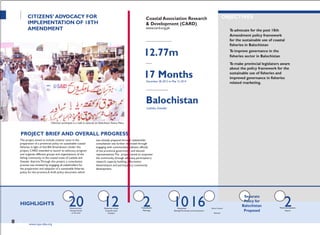













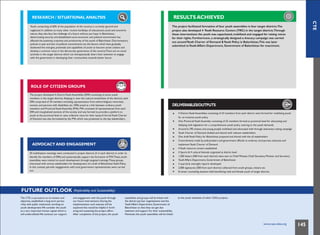




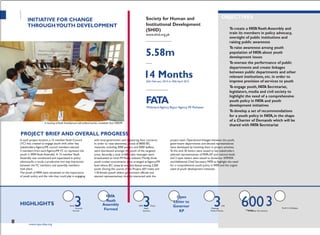


![1
OBJECTIVES
Strengthened citizens‟ voice through, among others, oversight of the print and/or
electronic media as well as of relevant official bodies, and/or advocacy for reforming
relevant laws, rules, policies, bye-laws, regulations, departments and practices at the
Federal and provincial levels to promote free, independent and responsible media.
Applied research on issues related to media freedom, independence and responsibility in the context of Pakistan
Concrete steps for establishment of forums where citizens, civil society groups, and representatives of press clubs and media associations
could participate in and contribute to the policy making, legislative and institutional reform processes in relation to print and electronic media
Civil society participation in the policy making and decision making processes at various stages relating to the Federal and provincial
governments through available forums or mechanisms [e.g. parliamentary committees] to convey citizens' voice and demands, as articulated
through evidence-based and participatory methods
Promotion of informed public dialogue around the freedom, independence and responsibility of print and electronic media and the required
changes in laws, policies, rules and practices; as well as about the challenges being faced in terms of promoting free, independent and responsible
media and how these could be addressed
Steps towards improved and more effective media reporting and debates about the need of addressing systemic constraints in the context of
ensuring free, independent and responsible media
Capacity building of stakeholders [e.g. civil society groups include representatives of press clubs, media associations, legislators, political leaders,
journalists and relevant public bodies] in terms of improved understanding of issues around free, independent and responsible media
Oversight of relevant government institutions [e.g. Ministry of Information, PEMRA, Press Council etc.] at various levels in order to collect
information and evidence for informing public discourse and provide appropriate feedback into the policy making, implementation or monitoring
processes at the Federal or provincial levels.
2
Civil Society-Government Partnership, or linkages, between and among Government and
non-Government actors for improved accountability in relation to print and electronic media.
Establish partnerships/ linkages with (or make use of) parliamentary committees (e.g. National/Provincial Assembly Committees), and/or other
institutions meant for grievance redress or accountability (e.g. Federal/Provincial Ombudsman, PEMRA and Press Council) at the Federal or provincial
levels with the aim of making relevant state institutions accountable to citizens
Establish partnership/ linkages with relevant public bodies (e.g. Federal/Provincial Assembly Committees on Information, Press Council, PEMRA, etc.)
to establish appropriate forums where citizens and civil society groups could ask questions, seek answers, raise concerns about performance of
relevant institutions and suggest reforms in media related laws, rules, institutions and practices
Organize public forums to discuss the performance of relevant public bodies or political parties and, thereby, set in motion the process of public
accountability in the form of, among others, building public opinion and informing electoral outcomes.](https://image.slidesharecdn.com/7a2eec09-047c-4b6e-bded-0ee6c272eca9-170111120311/85/CVP-SHOWCASE-CATALOG-173-320.jpg)



